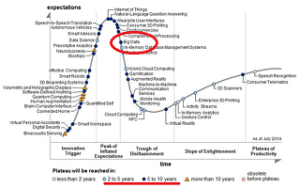
Arquivo para September 20th, 2016
Significant technologies for Big Data
Big Data is still an emerging technology, the cycle from emergence of a technology until their maturity, if we look at the hypo cycle Gartner curve, we see in it the Big Data on seed from the appearance, to the disappointment, but then comes the maturity cycle.
if we look at the hypo cycle Gartner curve, we see in it the Big Data on seed from the appearance, to the disappointment, but then comes the maturity cycle.
To answer the questions posed in the TechRadar: Big Data, Q1 2017, a new report was produced saying the 22 possible technologies maturities in the next life cycle, including 10 steps to “mature” the Big Data technologies.
In view of this research, the ten points that can, to increase the Big Data are:
- Predictive analytics: software solutions and / or hardware that enable companies to discover, evaluate, optimize and deploy predictive models through the analysis of large data sources to improve business performance and risk mitigation.
- It will take NoSQL databases: key-value, documents and graphic databases.
- Research and knowledge discovery: tools and technologies to support the extraction of information and new perspectives of self-service large data repositories unstructured and structured that reside in multiple sources, such as file systems, databases, streams , APIs and other platforms and applications.
- analysis Flows (analytics Stream): software that can filter, aggregate, enrich and analyze a high data transfer rate from multiple sources online disparate data and any data format (semi-structured).
- Persistent analysis (in-memory) “fabric”: allowing access to low latency and processing large amounts of data by distributing data over the dynamic random access memory (DRAM), Flash or SSD a distributed computer system.
- Distributed stores files: a network of computers where the data are stored in more than one node often replicated way, both redundancy and performance.
- Data virtualization: a technology that provides information from various data sources, including large data sources such as Hadoop tool and distributed data stores in real-time or near-real time (small delays).
This will require the last 3 steps that research suggests: 8. data integration: tools for data orchestration (Amazon Elastic MapReduce (EMR), Apache Hive, Apache Pig, Apache Spark, MapReduce, Couchbase, Hadoop, MongoDB) data preparation (modeling, cleaning and sharing) and data quality (enrichment and data cleansing at high speed) will be needed and that is done, you can make big productive Date “providing values something of growth through a balance Phase “

